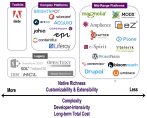The Greenfield Drupal Conundrum
Last month's release of the long-awaited Drupal Version 8 presents a dilemma for enterprises considering adopting Drupal afresh. Typically customers want the latest-and-greatest version, but in this case, you'll want to pause and consider the surprisingly knotty trade-offs.
The Case for Drupal 8
Drupal 8 brings manifold improvements over 7.x, but the overall story is that the new version becomes much better suited to larger enterprise customers, employing more modern, standardized, and object-oriented frameworks.
The other reason to consider Drupal 8 is that moving from 7 to 8 will not be an upgrade. Let me repeat: it won't be an upgrade. It's a replacement. Do you really want to go through that in a couple years' time?
The Case for Drupal 7
Drupal 7 offers a platform that leverages the full weight of the broad Drupal community. All the key modules are 7-compatible. All the major Drupal integrators and hosting companies are well-familiar with its benefits and demerits. A large and diverse customer community has committed to it. If you don't like Drupal 8, you'll be able to find at least one fork that will continue a 7ish trunk into the future.
Version 7 will also remain more accessible to developers. Today much of Drupal's complexity revolves around mastering its vast and heterogeneous set of moving parts. With Drupal 8 much of the complexity will come in the level of developer expertise required to master more sophisticated subsystems. The new version calls for more higher-skilled, enterprise-savvy developers. The junior PHP developer who relies on an effective mental map of Drupal 7's nooks and crannies may struggle under a new system that requires greater programming expertise.
The Case for Neither
So if you're just getting started with Drupal in 2016, which do you chose? The quirky version the community knows, or the sophisticated new version that won't see primetime for at least another year, maybe longer? It really boils down to your risk tolerance. Which is worse for you: the immaturity of a new version, or the pain (some years down the road) of a replacement?
Maybe the answer is "neither." At least one of our major subscribers recently took a very close look at both alternatives and found them prohibitively unpalatable relative to the choices presented by other Web Content & Experience Management (WCM) technologies right now.
In software, as in love, sometimes the match is right but the timing is wrong. 2016 could be bad timing for some first-time Drupal customers.








